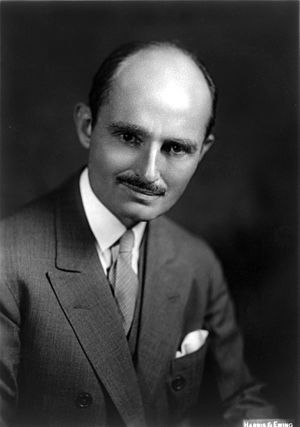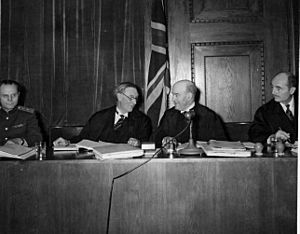Francis Biddle facts for kids
Quick facts for kids
Francis Biddle
|
|
|---|---|
 |
|
| 58th United States Attorney General | |
| In office August 26, 1941 – June 26, 1945 |
|
| President | Franklin D. Roosevelt Harry S. Truman |
| Preceded by | Robert H. Jackson |
| Succeeded by | Tom C. Clark |
| 25th United States Solicitor General | |
| In office January 22, 1940 – August 25, 1941 |
|
| President | Franklin D. Roosevelt |
| Preceded by | Robert H. Jackson |
| Succeeded by | Charles Fahy |
| Judge of the United States Court of Appeals for the Third Circuit | |
| In office March 4, 1939 – January 22, 1940 |
|
| Appointed by | Franklin D. Roosevelt |
| Preceded by | Joseph Buffington |
| Succeeded by | Herbert Funk Goodrich |
| Deputy Chair of the Board of Directors of the Federal Reserve Bank of Pennsylvania | |
| In office December 31, 1938 – April 1939 |
|
| Preceded by | Thomas B. McCabe |
| Succeeded by | Alfred H. Williams |
| Member of the Board of Directors of the Federal Reserve Bank of Pennsylvania | |
| In office April 1938 – April 1939 |
|
| Preceded by | Harry L. Cannon |
| Succeeded by | Warren F. Whittier |
| Chair of the National Labor Relations Board | |
| In office November 15, 1934 – 1935 |
|
| Preceded by | Lloyd K. Garrison |
| Succeeded by | J. Warren Madden (new agency established through the NLRA) |
| Personal details | |
| Born |
Francis Beverley Biddle
May 9, 1886 Paris, France |
| Died | October 4, 1968 (aged 82) Wellfleet, Massachusetts, U.S. |
| Political party | Democratic |
| Spouse | Katherine Garrison Chapin |
| Children | 2 |
| Education | Harvard University (BA, LLB) |
| Signature | |
| Military service | |
| Branch/service | United States Army |
| Years of service | 1918 |
| Rank | Private |
| Unit | Field Artillery |
| Battles/wars | World War I |
Francis Biddle was an important American lawyer and judge. He was born in 1886 and passed away in 1968. During World War II, he served as the top lawyer for the United States government. This job is called the Attorney General. After the war, he was a main judge at the famous Nuremberg Trials. He also worked as a judge in a high court in the U.S.
Contents
Early Life and Education
Francis Biddle was born in Paris, France. His father was a law professor. Francis came from a well-known family. He went to Groton School and then to Harvard University. He earned degrees in arts and law there.
Early Career as a Lawyer
After law school, Biddle worked for a Supreme Court Justice. This is like being a helper for a judge. He then practiced law in Philadelphia, Pennsylvania for many years.
During World War I, Biddle served as a private in the United States Army. He was in training for the Field Artillery but the war ended before he saw combat.
Working for President Roosevelt
In the 1930s, President Franklin D. Roosevelt gave Biddle many important government jobs. In 1934, he became the Chairman of the National Labor Relations Board. This board helps deal with issues between workers and their employers.
Later, in 1939, President Roosevelt made Biddle a judge for the United States Court of Appeals for the Third Circuit. He served in this role for about a year. Then, in 1940, he became the U.S. Solicitor General. This job involves representing the government in court cases.
In 1941, President Roosevelt chose Biddle to be the Attorney General of the United States. This meant he was the head of the Justice Department.
During World War II
As Attorney General during World War II, Biddle had to make tough decisions. He worked to stop publications that spread harmful ideas. He also dealt with cases involving people accused of working against the U.S. government.
In 1942, Biddle was involved in a case about eight German spies. These spies were caught planning to harm the United States. President Roosevelt decided they should be tried by a special military court. Biddle argued that these spies were not regular soldiers. The Supreme Court agreed that the military court was allowed to try them. Six of the spies were found guilty and executed. The other two were sent to prison because they helped the FBI.
Japanese American Internment
One of the most difficult issues Biddle faced was the internment of Japanese Americans. This was when many people of Japanese descent, including U.S. citizens, were forced to live in special camps during the war.
Francis Biddle was the only high-ranking official who disagreed with this policy from the start. In 1943, he asked President Roosevelt to close the camps. He said it was wrong to keep loyal American citizens in "concentration camps." He felt it went against American values. However, the camps stayed open for another year.
After the war, Biddle wrote about this time. He said that Japanese Americans were treated unfairly. They were put in camps just because of their background, unlike German or Italian immigrants.
Protecting Civil Rights
Biddle also worked to protect the civil rights of African Americans. He told lawyers in the Justice Department to fight against forced labor in the Southern United States. He wanted to make sure that employers and local officials could be charged with slavery or involuntary servitude if they forced people to work.
After the War: Truman Administration

After President Roosevelt passed away, President Harry S. Truman asked Biddle to resign as Attorney General. Soon after, Truman appointed Biddle as a judge for the Nuremberg Trials. These trials were held in Germany after World War II. They brought to justice important Nazi leaders for their terrible crimes.
In 1947, Truman wanted Biddle to represent the U.S. at the United Nations Economic and Social Council. But the U.S. Senate did not approve the nomination, so Biddle withdrew his name.
In 1950, Biddle became the chairman of a group called Americans for Democratic Action. He held this position for three years. Later, he wrote two books about his life and experiences. His last public role was leading the Franklin D. Roosevelt Memorial Commission. He retired from this in 1965.
Personal Life
Francis Biddle was married to a poet named Katherine Garrison Chapin. They had two sons together.
Biddle passed away on October 4, 1968, from a heart attack at his summer home in Wellfleet, Massachusetts. He was 82 years old. He was buried in Whitemarsh, Pennsylvania.
Writing and Legacy
Francis Biddle was also a talented writer. In 1927, he wrote a novel. In 1942, he wrote a biography about Justice Oliver Wendell Holmes, whom he had worked for. This book was even made into a play and a movie! He also wrote books about democracy and America's role in the world.
In Popular Culture
Francis Biddle has been shown in movies and plays. An actor named Len Cariou played him in a TV miniseries called Nuremberg in 2000. He was also the main character in a play called Trying in 2004. This play was written by Joanna McClelland Glass, who used to be Biddle's personal secretary.
Images for kids
See also
 In Spanish: Francis Biddle para niños
In Spanish: Francis Biddle para niños
- List of law clerks of the Supreme Court of the United States (Seat 2)
 | William Lucy |
 | Charles Hayes |
 | Cleveland Robinson |

